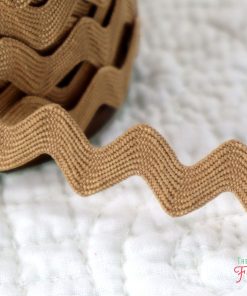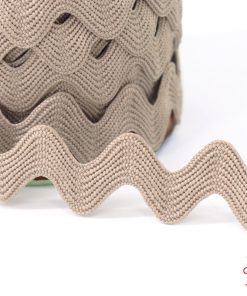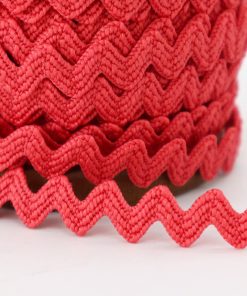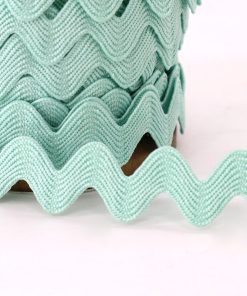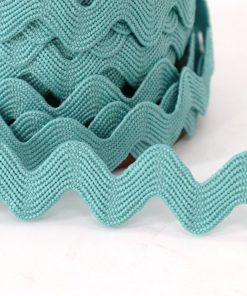Stoppax Embroidery & Darning Foot, (Vintage Original) The Singer Featherweight Shop
$ 77,95 $ 38,98
This little embroidery & darning attachment is one of those rare gems that might be stashed away in one of your vintage sewing accessory boxes. Somewhat funny-shaped with a coiled wire, but ingenious in design and function. It works very well with the Singer Featherweight 221 or 222K or any other low shank vintage Sewing Machine. What’s nice about this attachment is that you can go from straight stitching to free-motion embroidery & darning just by flipping the upper wire.
With the right instruction, feed-dogs covered or lowered, and the appropriate embroidery/darning attachment, Machine Embroidery can range from the ‘Practical’ (darning) to the ‘Artistic’ (embroidery)!
You can start out simple – everything, as you know, takes practice. But, before you can start at all, you will certainly need this Embroidery/Darning Attachment to help you. Stephanie Yu-Falkenstein was very helpful in providing some of the photographs as well as creating this short video, under the video tab, to demonstrate how she used the Stoppax Darner on her Singer Featherweight.
Take note of the following before you begin:
#1 ~ Attach a feed dog cover plate or put your feed dogs in neutral (raising the stitch regulator so that it sticks straight out or parallel to the floor will cause your feed dogs to neither go forward or backward and stitch in a stationary position). Beginners usually find it easier to just cover the feed dogs.
#2 ~ Make sure the coil isn’t screwed down too tightly. To raise the inner coil, turn the upper wire and it will “unscrew”. You don’t want it down too far, but just enough so that with each up and down motion of the needle bar the presser bar is raised ever so slightly to allow you to move freely between each stitch. If too much of the inner coil is hidden then it will take more pressure of the needle bar to raise the upper wire, which aids in the presser bar lifting.
#3 ~ Attach the wire over your presser foot using your regular thumb screw.
#4 ~ Using a small quilt sandwich, begin practicing your free-motion work. Yes, you can most certainly do free-motion work on your Featherweight, however, for long projects or quilts, be sure to give your motor a cool-down rest, staggering your sewing times. For example, I made a baby quilt and I quilted it in quarter time allotments allowing my motor to completely cool in between.
#5 ~ Having a tube of motor lubricant is wise, too, because as the motor heats up it will wick the grease, lubricating the appropriate parts inside the motor.
Red-Work, Blue-Work, Green-Work, or what-ever-color suits your fancy are going to have an entirely different meaning with the ability to embroider it on your machine. Remember the old-fashioned Friendship quilts? Take your finished quilt squares to a bridal shower and have all in the wedding party sign them in pencil or water-erasable fabric ink. Then follow their signature with your Embroidery Attachment – what a unique gift to present the bride. Or even as a baby gift, you could use a vintage iron on transfer with the darling prints and patterns from yesteryear and embroider a Nursery-Rhyme Quilt.
Really and truly, with a little practice, you’ll be able to follow a signature in no time at all.
Instructions for use will be included.
LOW SHANK: fits the Singer Featherweight 221 & 222K and all low, vertical shank Sewing Machines (i.e. 15, 27, 28, 66, 99, 185, 127, 128, 192, 201, etc.).
Embroidery Plate & Hoop are not included, but you can order them here.
Fast Shipping & Professional Packing
We have a range of shipping options due to our long-term partnership with UPS FedEx DHL. Our warehouse personnel will pack every item to our exacting specifications. Prior to shipping your items will be thoroughly examined and secured. Each day, we ship to thousands of clients in many countries. This demonstrates our dedication to become the biggest online retailer on earth. There are distribution centers and warehouses located in Europe and the USA.
Note: Orders that include more than one item are assigned a processing time depending on the item.
We will carefully examine all items ordered before shipping. Today, the majority of orders will be shipped within 48 hours. Delivery time ranges between 3-7 days.
Returns
Stock is dynamic, and cannot be fully controlled by us because of the involvement of many entities, including the factory as well as our warehouse. This means that the actual stock could alter at any time. It's possible that you may not receive your order once the order has been made.
Our policy runs for 30 days. If you have passed 30 days without a trace since the purchase however, we're unable to give you a refund or exchange.
In order to be eligible for a refund your product must be unopened and in the same condition as when you received it. It must also be returned in its original packaging.
Related products
Vintage Advertisements
Advertisements, Rare Singer ITALIAN – (Vintage Original) The Singer Featherweight Shop
Ribbons & Trim
1/4″ Inch DENIM VINTAGE TRIM RIC RAC by Lori Holt (by the yard) The Singer Featherweight Shop
Vintage Advertisements
Advertisement Leaflets, Replica Featuring the Singer Featherweight The Singer Featherweight Shop
Ribbons & Trim
1/4″ Inch RILEY GREEN VINTAGE TRIM RIC RAC by Lori Holt (by the yard) The Singer Featherweight Shop
Craft Measuring & Marking Tools
Alphabitties – Alphabet & Number Tags by It’s Sew Emma The Singer Featherweight Shop
Ribbons & Trim
1/4″ Inch RILEY AQUA VINTAGE TRIM RIC RAC by Lori Holt (by the yard) The Singer Featherweight Shop
Ribbons & Trim
1/4″ Inch PUMPKIN VINTAGE TRIM RIC RAC by Lori Holt (by the yard) The Singer Featherweight Shop
Ribbons & Trim
1/4″ Inch COTTAGE VINTAGE TRIM RIC RAC by Lori Holt (by the yard) The Singer Featherweight Shop
Ribbons & Trim
1/4″ Inch STEEL VINTAGE TRIM RIC RAC by Lori Holt (by the yard) The Singer Featherweight Shop
Vintage Advertisements
Vintage Advertisements
Ashtray, Centennial – RARE Singer (Vintage Original) The Singer Featherweight Shop
Ribbons & Trim
1/4″ Inch CLOUD VINTAGE TRIM RIC RAC by Lori Holt (by the yard) The Singer Featherweight Shop
Ribbons & Trim
1/4″ Inch JADE VINTAGE TRIM RIC RAC by Lori Holt (by the yard) The Singer Featherweight Shop
Ribbons & Trim
5/8″ Inch JADE VINTAGE TRIM Large RIC RAC by Lori Holt (by the yard) The Singer Featherweight Shop


























